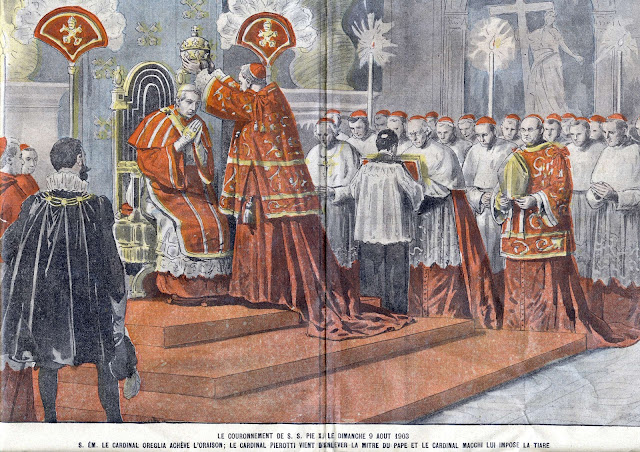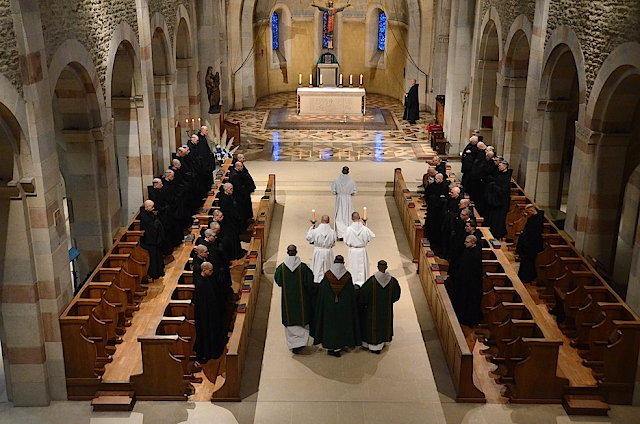Catholic devotions for the 3rd September
Scroll down for today's
Saint of the DayReading of the Martyrology
Dedication of the Month
Dedication of the Day
Rosary
Five Wounds Rosary in Latin
Seven Sorrows Rosary in English
Latin Monastic Office
Reading of the Rule of Saint Benedict
Celebration of Mass
Reading from the School of Jesus Crucified
Feast of Pope Saint Pius X
The Oath against Modernism
I
firmly embrace and accept each and every definition that has been set forth and declared by the unerring teaching authority of the Church, especially those principal truths which are directly opposed to the errors of this day. And first of all, I profess that God, the origin and end of all things, can be known with certainty by the natural light of reason from the created world (see Rom. 1:19), that is, from the visible works of creation, as a cause from its effects, and that, therefore, his existence can also be demonstrated: Secondly, I accept and acknowledge the external proofs of revelation, that is, divine acts and especially miracles and prophecies as the surest signs of the divine origin of the Christian religion and I hold that these same proofs are well adapted to the understanding of all eras and all men, even of this time. Thirdly, I believe with equally firm faith that the Church, the guardian and teacher of the revealed word, was personally instituted by the real and historical Christ when he lived among us, and that the Church was built upon Peter, the prince of the apostolic hierarchy, and his successors for the duration of time. Fourthly, I sincerely hold that the doctrine of faith was handed down to us from the apostles through the orthodox Fathers in exactly the same meaning and always in the same purport. Therefore, I entirely reject the heretical’ misrepresentation that dogmas evolve and change from one meaning to another different from the one which the Church held previously. I also condemn every error according to which, in place of the divine deposit which has been given to the spouse of Christ to be carefully guarded by her, there is put a philosophical figment or product of a human conscience that has gradually been developed by human effort and will continue to develop indefinitely. Fifthly, I hold with certainty and sincerely confess that faith is not a blind sentiment of religion welling up from the depths of the subconscious under the impulse of the heart and the motion of a will trained to morality; but faith is a genuine assent of the intellect to truth received by hearing from an external source. By this assent, because of the authority of the supremely truthful God, we believe to be true that which has been revealed and attested to by a personal God, our creator and lord.
Furthermore, with due reverence, I submit and adhere with my whole heart to the condemnations, declarations, and all the prescripts contained in the encyclical Pascendi and in the decree Lamentabili,especially those concerning what is known as the history of dogmas. I also reject the error of those who say that the faith held by the Church can contradict history, and that Catholic dogmas, in the sense in which they are now understood, are irreconcilable with a more realistic view of the origins of the Christian religion. I also condemn and reject the opinion of those who say that a well-educated Christian assumes a dual personality-that of a believer and at the same time of a historian, as if it were permissible for a historian to hold things that contradict the faith of the believer, or to establish premises which, provided there be no direct denial of dogmas, would lead to the conclusion that dogmas are either false or doubtful. Likewise, I reject that method of judging and interpreting Sacred Scripture which, departing from the tradition of the Church, the analogy of faith, and the norms of the Apostolic See, embraces the misrepresentations of the rationalists and with no prudence or restraint adopts textual criticism as the one and supreme norm. Furthermore, I reject the opinion of those who hold that a professor lecturing or writing on a historico-theological subject should first put aside any preconceived opinion about the supernatural origin of Catholic tradition or about the divine promise of help to preserve all revealed truth forever; and that they should then interpret the writings of each of the Fathers solely by scientific principles, excluding all sacred authority, and with the same liberty of judgment that is common in the investigation of all ordinary historical documents.
Finally, I declare that I am completely opposed to the error of the modernists who hold that there is nothing divine in sacred tradition; or what is far worse, say that there is, but in a pantheistic sense, with the result that there would remain nothing but this plain simple fact-one to be put on a par with the ordinary facts of history-the fact, namely, that a group of men by their own labor, skill, and talent have continued through subsequent ages a school begun by Christ and his apostles. I firmly hold, then, and shall hold to my dying breath the belief of the Fathers in the charism of truth, which certainly is, was, and always will be in the succession of the episcopacy from the apostles. The purpose of this is, then, not that dogma may be tailored according to what seems better and more suited to the culture of each age; rather, that the absolute and immutable truth preached by the apostles from the beginning may never be believed to be different, may never be understood in any other way.
I promise that I shall keep all these articles faithfully, entirely, and sincerely, and guard them inviolate, in no way deviating from them in teaching or in any way in word or in writing. Thus I promise, this I swear, so help me God. . .
The Reading from the Martyrology
September is the Month of Our Lady of Sorrows
The Seven Promises to those devoted to the Seven Sorrows of Our Lady
I will grant peace to their families.
They will be enlightened about the divine mysteries.
I will console them in their pains and I will accompany them in their work.
I will give them as much as they ask for as long as it does not oppose the adorable will of my divine Son or the sanctification of their souls.
I will defend them in their spiritual battles with the infernal enemy and I will protect them at every instant of their lives.
I will visibly help them at the moment of their death, they will see the face of their Mother.
I have obtained from my divine Son, that those who propagate this devotion to my tears and dolors, will be taken directly from this earthly life to eternal happiness since all their sins will be forgiven and my Son and I will be their eternal consolation and joy.
Sunday is the Day dedicated to the Resurrection and the Holy and Undivided Trinity
The Glorious Mysteries of the Rosary are prayed on Sunday
The Rosary in Latin
Chaplet of the Five Holy Wounds of Christ in Latin
Chaplet of the Seven Sorrows of Our Lady in English
Latin Monastic Office for today from Le Barroux in France Texts also provided
14 Et quærens Dominus in multitudine populi cui hæc clamat operarium suum iterum dicit:
15 Quis est homo qui vult vitam et cupit videre dies bonos?
16 Quod si tu audiens respondeas: Ego, dicit tibi Deus:
17 Si vis habere veram et perpetuam vitam, prohibe linguam tuam a malo et labia tua ne loquantur dolum; deverte a malo et fac bonum, inquire pacem et sequere eam.
18 Et cum hæc feceritis, oculi mei super vos et aures meas ad preces vestras, et antequam me invocetis, dicam vobis: Ecce adsum.
19 Quid dulcius ab hac voce Domini invitantis nos, fratres carissimi?
20 Ecce pietate sua demonstrat nobis Dominus viam vitæ.
The Prologue
14 And the Lord, seeking his own workman in the multitude of the people to whom he cries out, says again:
15 Who is it who desires life, and longs to see good days? (Psalm 34:12)
16 And if you, hearing him, respond, “I am the one!” God says to you:
17 “If you desire true and everlasting life, keep your tongue from evil and your lips from speaking deceit. Turn aside from evil and do good; seek peace and pursue it (Psalm 34:13-14).
18 And when you have done these things, my eyes will be upon you, and my ears towards your prayers; and before you call upon me, I will say to you, ‘Behold, I am here.’ “(Isa. 58:9)
19 What can be sweeter to us (cf ? Ps 34:9) than this voice of the Lord inviting us, dearest brothers?
20 Behold in his loving kindness the Lord shows us the way of life.
Today's Celebration of the Mass













.jpeg)

Comments